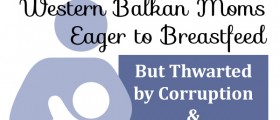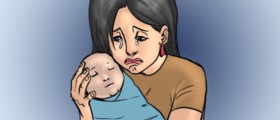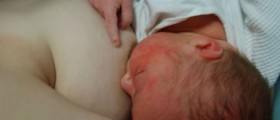
Mothers may experience bouts of unexplainable sadness once they have weaned their babies. This normal and expected process may appear as something distancing them from their baby. However, in some situations the reasons behind the sadness a mother feels once she stops breastfeeding her child cannot be explained that easily.
Weaning is a process of replacing breastfeeding with other forms of nutrition for your child. This usually takes place once a child is old enough for being able of consuming other forms of food. Yet, on some other occasions, the reasons behind weaning may be sudden and unexpected. Either way, while the baby is being breastfed, he/she receives all the necessary nutrients through the mother's milk, keeping him/her strong, healthy and free from many illnesses and healthy issues. Thus, breastfeeding is something beneficial in every respect. Yet, it needs to stop at some point of the baby's life.
Weaning Your Child
When you plan to wean your baby, keep in mind that this is recommended to be done gradually. Basically, decrease the supply of breast milk over time and start introducing other types of food step-by-step.
Firstly, you might stop breastfeeding at a certain, regular point of every day. For example, you may decide to replace late-morning breastfeeding. At the selected time, which is best to be the least important to the baby, offer a bottle or a cup instead of the breast. Stay persistent and repeat this change until the child gets used to it.
Then, after a while, remove yet another session of breastfeeding and replace it with other forms of feeding. Keep in mind that, sometimes, this change may result in your breasts being full. However, do not treat this problem with breastfeeding again. Rather, remove just as little milk you need in order for the discomfort to stop. Over a short course of time, your organism will decrease the milk production on its own.
If your baby starts vomiting or having diarrhea, or he/she appears to be very irritable or anxious, there is a high likelihood that the weaning took place too fast. Also, if you start feeling that your breasts are overly full or swollen, causing you to suffer from fevers or overall feelings of unhealthiness, you have probably weaned your baby too early. Additionally, if this is the case, your breasts may appear tender and worm.
Also, early weaning is known to trigger feelings of sadness in the mother, being related to hormonal activities inside her body.
Weaning and Sadness
Sadness usually comes after you have weaned your baby over a short period of time or “cold turkey”. Nevertheless, sometimes, even mothers who have been breastfeeding enough still feel sadness once they stop feeding their baby this way.
So, be prepared for this change and accept it as something natural, taking place due to the hormonal imbalances and variations affecting you. Also, do not be afraid or reluctant to seek help and support from your spouse, family and friends during this time. The sense of loss and abandonment may be too strong for you to bear alone and it is best to share your emotions with others too. After all, breastfeeding presents an incredibly strong feeling of closeness between you and your child and cessation of such a bond can truly be more than overwhelming.
Weaning Precaution and Statistical Data
Once you have weaned your baby, if your breasts feel full, get rid of the extra milk by using a pump or your hand. However, expel solely enough milk to ease the discomfort.
Additionally, wearing a supportive bra which is comfortable will promote proper blood circulation in your breasts, helping you feel better. If your breasts swell after you have weaned your child, apply ice for 20 minutes maximum, 4 times a day, wrapping it in a piece of cloth.
Alternatively, you can place cold, clean cabbage leaves inside your bra, supporting your breasts, replacing them with new ones on a 2 hour basis. Cabbage will help your breasts stop producing milk.
As for other means of dealing with the pain, you can always take over-the-counter painkillers like ibuprofen.
According to US Centers for Disease Control, in 2001, 65.1% of mothers were breastfeeding while in hospitals, 27% during the first 6 months and 12.3% during the first 12 months. Interestingly, in 2002 and 2003, the numbers jumped to 70.9% in hospitals, 36.2% during the first 6 months and 17.2% during the first year, with an addition of 5.7% of mothers breastfeeding their children even once they have reached the 19th month of their life.
Other researchers said that 18% of all babies are bottle-fed from the first day of their lives, mainly with formula, while 6% of babies are breastfed even once they have reached their 3rd year of life.
To sum up, breastfeeding is something that can stop at various points of your child's life and your own life. Some others wean their children at an early age, while some others do it much later. Either way, this form of separation from your baby may result in sadness in some cases. However, this is normal and expected, due to hormones in your body.
Make sure you do not wean your baby abruptly or too early without a necessity for this and do not be afraid to seek support during the time of sadness.














Your thoughts on this
Loading...